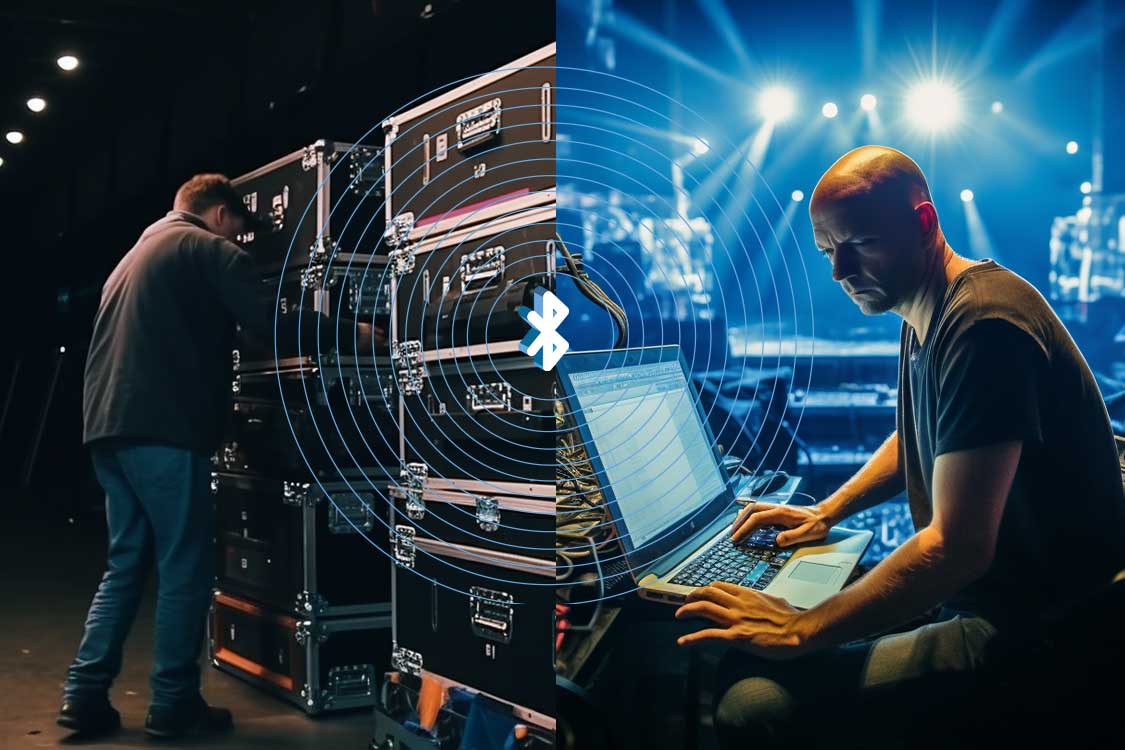IoT Solutions

Asset tracking is fundamental in modern workplaces, and the role of tags has become pivotal in ensuring efficient asset management. The surge in their popularity is attributed to the increasing need for real-time management of assets in businesses. Inadequate asset monitoring poses risks such as loss or breakdowns, leading to potential catastrophic consequences and increased operational costs. Tags, particularly within the framework of the Internet of Things (IoT), have proven to be a groundbreaking innovation this area.
Understanding Tags: A Game-Changing Innovation
Tags are small yet powerful devices designed to be affixed to critical assets within a business. By harnessing the capabilities of tags, the risk of becoming disconnected from these vital assets is greatly reduced.
There are many technologies that can be used to track assets. Let’s focus specifically on Bluetooth asset tracking tags. These compact devices can be attached to objects ranging in size from a tennis ball to a large shipping container. As a member of the smart device family, Bluetooth asset tracking tags provide 100% visibility of assets in complex environments. They offer valuable insights into asset whereabouts, real-time usage and telemetry data. Furthermore, they can be programmed to issue alerts when assets are handled beyond standard parameters.


One features of Bluetooth tags is their low energy consumption, making them a popular solution for asset tracking and management. A single charge is typically sufficient to power these devices for up to a year, minimizing the need for frequent maintenance. When their useful life is complete, Bluetooth low energy tracking tags can be easily decommissioned or reinstated after a battery swap. This flexibility allows tags to be utilized for a variety of asset management duties, adapting to the evolving needs of businesses.
How Do Bluetooth Tags Work?
The inner workings of a Bluetooth low energy asset tracking are remarkably straightforward, contributing to their sleek and discreet appearance. These tags consist of an integrated circuit (IC), an antenna and a substrate, which allows for a more streamlined design compared to other technologies.
The operation of a Bluetooth tag is refreshingly uncomplicated. When in use, assets become visible to tracking apps or software as long as the tag remains within range. This means you can effortlessly identify specific assets from a large group by accessing their unique asset IDs or conducting keyword searches. Additionally, tags can be programmed to emit buzzing, flashing or vibrating signals, effectively indicating their precise location.
Bluetooth tags have gained immense popularity in consumer markets, offering affordable tracking solutions for items like laptops, keys and equipment. In industrial settings, specialized Bluetooth tags excel in performing ancillary functions such as temperature monitoring and maintaining cold storage equipment. If active tags are equipped with Bluetooth 4.0, they allow for tracking inventory over significant distances and the batteries in such tags are guaranteed to function for up to five years.
Bluetooth Tags: A Critical Analysis
Bluetooth tags, while highly useful, do come with their share of imperfections. Let’s explore some of the challenges associated with Bluetooth tags:
- Limited Range: Bluetooth tags perform optimally within a range of 100-200 feet of floor space. Beyond that range, their tracking accuracy may be compromised. If you’re considering a tracking solution for a multi-building or multi-floor setting, you may need additional tags to compensate for limited coverage or lower accuracy.
- Limited Battery Capacity: The capacity of Bluetooth tag batteries is relatively constrained. While manufacturers often guarantee uninterrupted battery performance for up to one year, this is not an absolute guarantee as battery life can be influenced by environmental factors and signal frequency. Replacing batteries in a large number of Bluetooth tags can be a costly exercise, considering you’ll likely need to replace dozens of batteries at once.
- Cost: Although Bluetooth trackers are commonly available at affordable prices within the consumer market, they may not be easily affordable for applications outside of that sphere. When it comes to serious asset tracking involving critical assets, the hardware costs can skyrocket. Industrial-grade Bluetooth tags, designed to meet specific specifications, can be quite expensive for end customers, both in terms of initial procurement expenses and routine maintenance.
The Final Word for Efficiency – Mapsted
As an IoT-based solution, Mapsted seamlessly integrates with a vast array of existing IoT technologies, ensuring 100% interoperability. Unlike other solutions that require a high density of Bluetooth tags to address range and accuracy limitations, Mapsted Tag stands out with its remarkable hardware optimization. With Mapsted, you’ll need 10 times fewer tags to achieve comprehensive coverage and pinpoint accuracy.
Our cutting-edge Tags are meticulously calibrated to identify objects with an impressive accuracy of up to 1-5 metre in most indoor environments. This incredible feat is made possible by our state-of-the-art AI-powered algorithms, which leverage the power of artificial intelligence to revolutionize asset tracking. With Mapsted, you can effortlessly track devices and equipment even beyond visual range, unlocking unprecedented savings and boosting productivity like never before.
What Sets Mapsted Apart from the Rest?
- High Performance Battery: Say goodbye to frequent battery replacements and hello to long-lasting power. With Mapsted Tags, you only need to swap the battery once every 5 years and we don’t have any hidden clauses or surprises. These tags excel in both indoor and outdoor conditions, maintaining their performance without faltering. Charging the tags is a breeze too, as a regular USB charger is all you need to top up the battery. Once you have Mapsted Tags, you can truly purchase them once and forget about maintenance, enjoying a hassle-free experience.
- Top-Notch Security: Security is a top priority in the IoT world and Mapsted Tags take it to the next level. Unlike many other IoT devices that are vulnerable to tampering, Mapsted Tags are built with robust tamper-proofing mechanisms. Each tag acts as a fortress, resisting any attempts to manipulate or tamper with the device. In the event that a tag is unmounted or interfered with, it immediately alerts the administrators about the potential risk.
- Lightweight Design: Mapsted Tags combine functionality with a sleek and minimalist design. They are not bulky replicas of first-generation mobile phones. Weighing in at a mere 100 grams each, these tags blend seamlessly into their surroundings. Whether they are mounted on smaller objects or larger assets, they remain inconspicuous on the surface, silently providing precise location data to the paired asset management software. With Mapsted Tags, you can enjoy the benefits of accurate tracking without compromising aesthetics or adding unnecessary bulk.
Start Managing Your Assets Now With Mapsted Tags
For asset-heavy industries demanding real-time location data, Mapsted offers a mature and reliable alternative to Bluetooth tags. With proven success across various industries, Mapsted is ready to transform your asset tracking experience. Contact us today to leverage the power of Mapsted’s cutting-edge solutions and join the wave of positive change in asset tracking.
If you found this read valuable, you should also check our guide on The Future of Asset Tracking: Emerging Technologies and Innovations to Watch. We’ve shed light on everything that’s new and upcoming in the asset tracking segment. Also we have a video on Mapsted’s location technology for hospitals and healthcare which deconstructs Mapsted’s technology and its benefits for hospitals.
Frequently Asked Questions
Q1. Why are tags becoming popular in asset tracking?
Ans. Tags are popular because they enable businesses to monitor and regulate assets in real-time, reducing the risk of loss or breakdowns. They help minimize overhead costs and improve productivity in asset management.
Q2. How do Bluetooth asset tracking tags work?
Ans. Bluetooth tags have a simple design consisting of an integrated circuit, antenna and substrate. When in use, the tags make assets visible to tracking apps or software within range, allowing for easy identification and location tracking. They can also be programmed to emit signals to indicate their location.
Q3. What are the challenges associated with Bluetooth tags?
Ans. Bluetooth tags have limitations such as limited range beyond 100-200 feet, potentially compromising tracking accuracy. They also have limited battery capacity, requiring replacements and incurring costs. Moreover, industrial-grade Bluetooth tags can be expensive for critical asset tracking.
Q4. What sets Mapsted apart from other solutions?
Ans. Mapsted offers 100% interoperability with existing IoT technologies and achieves comprehensive coverage and accuracy with 10 times fewer tags. Their Tags are calibrated for up to 1 meter accuracy using AI-powered algorithms, allowing tracking beyond visual range for increased savings and productivity.
Q5. What are the key features of Mapsted Tags?
Ans. Mapsted Tags feature a high-performance battery that requires a swap only once every 5 years, providing a maintenance-free experience. They also offer top-notch security with built-in tamper-proofing mechanisms. Additionally, the lightweight design of Mapsted Tags ensures discreet and seamless integration with assets.
